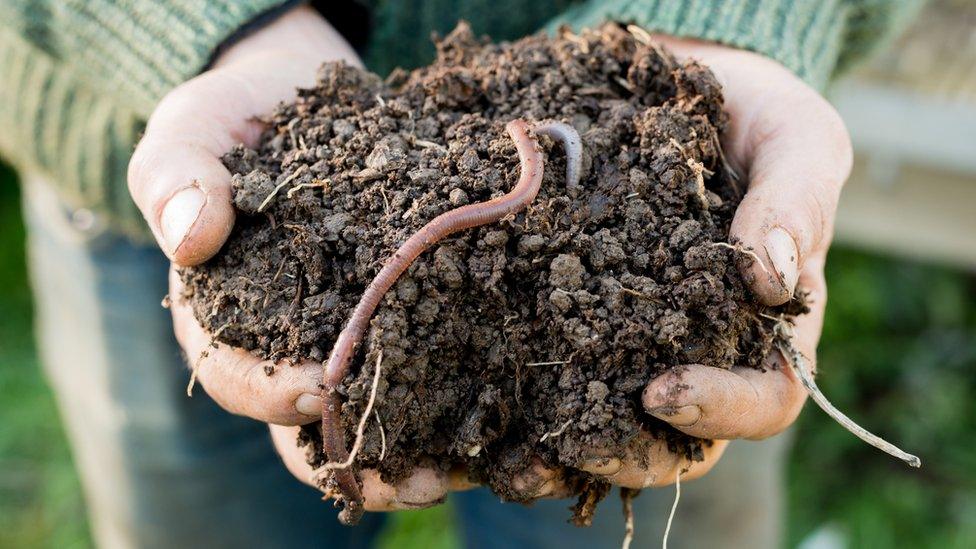Soil sounds: Why scientists are listening to 'noisy' worms
- Published
- comments

We know how noisy things can get at school and at home, but have you ever thought about the sound that comes from the species that live underground?
That's exactly what scientists have been looking at to find out how to keep soil healthy.
In the first study of its kind, researchers have used a technique called 'ecoacoustics' to listen to the activity of earthworms and other things living beneath the soil's surface.
It's hoped the study will help develop a system to help farmers grow their crops.

Soil is important for growing food
What is soil made from?
Soil is the top layer of the Earth's crust and is made up of a mixture of water, gases, minerals and organic matter.
It's where 95% of the planet's food is grown yet it has historically been left out of wider debates about protecting nature - because we know so little about it.
One teaspoon of healthy soil can contain up to a billion bacteria.
A study published in the journal Proceedings of the National Academy of Sciences estimates that more than half of all Earth's species live in soil.
It claims that soil is home to 90% of world's fungi, 85% of plants and more than 50% of bacteria - and 59% of life overall.
That makes it the single habitat where the greatest number of species live!

There are all sorts of sounds that can be heard from the soil
Why are scientists listening to soil?
The work has been done by the University of Warwick Crop Centre and Baker Consultants who are experts in ecoacoustics.
The theory is that noisy soil is healthy soil as there are more earthworms moving about, bringing in oxygen, draining water and making space for plant roots.
Soil health is very important to sustainable crop production and making sure the world has enough food.
At the moment farmers measure earthworm populations by digging and sorting large amounts of soil by hand which can take hours.
Farmers would place an instrument called a probe in the soil and record the sounds. These would then be analysed by computers to compare the soil sounds to others to see how healthy it is.
Using this technique means results can be generated in minutes.

Technology is now able to capture the sounds made beneath the soil
What sounds do earthworms make?
Dr Jacqueline Stroud, from the University of Warwick's Crop Centre explained that earthworms make rasping sounds and rhythmic scrunching as they move through the soil.
Here you can take a listen for yourself.
That scrunching sound is an earthworm moving through the soil (Getty Images/Baker Consultants)
Ants sound like rainfall when you're sitting indoors.
It sounds like rain falling (Getty Images/Baker Consultants)

Why are earthworms so important?
Earthworms influence soil health through their feeding and burrowing activities, and a high number of them in an area can improve plant productivity.
They are also an important source of food for wildlife like birds who eat them.
So the next time you see a worm that's wiggling its way along, remember it is helping to keep the soil healthy which makes it easier for plants to grow.
- Published15 April 2024

- Published11 September 2023

- Published7 January 2024

